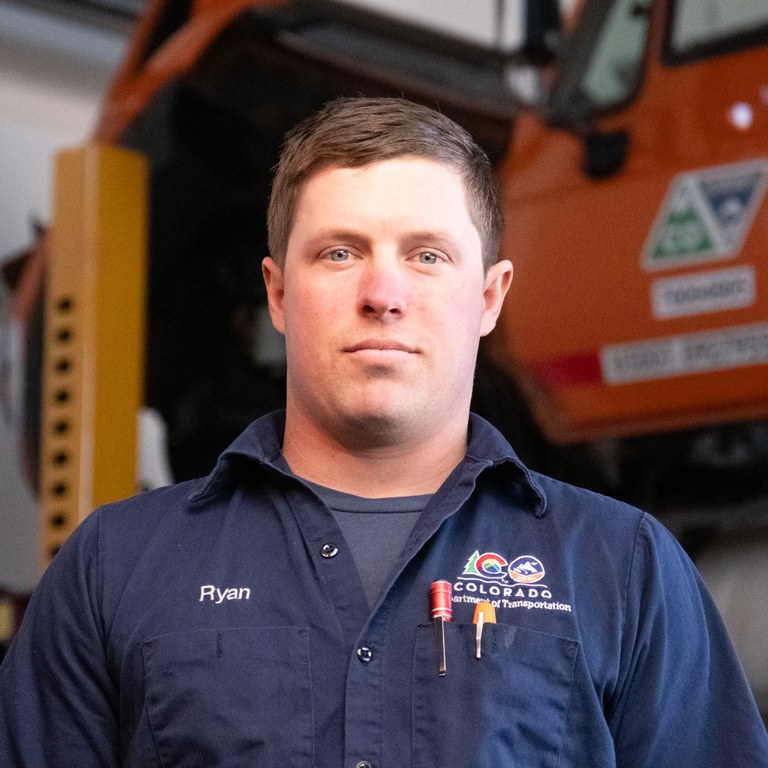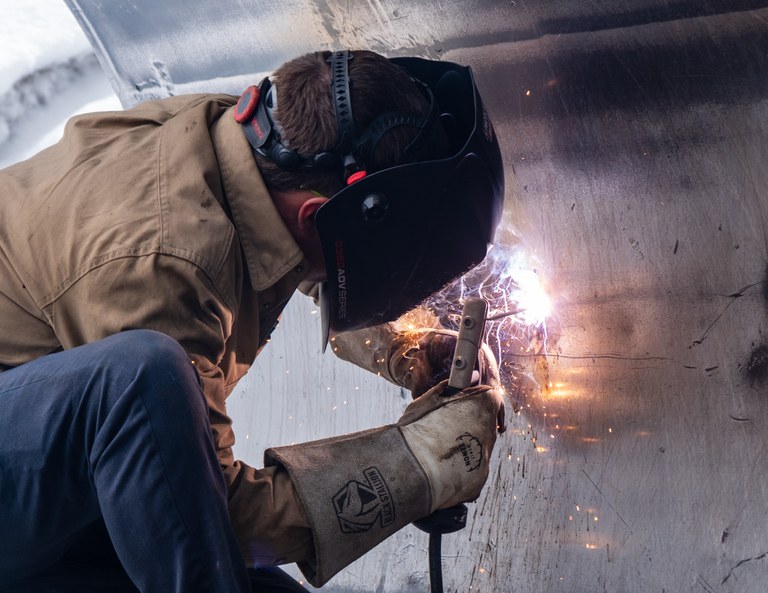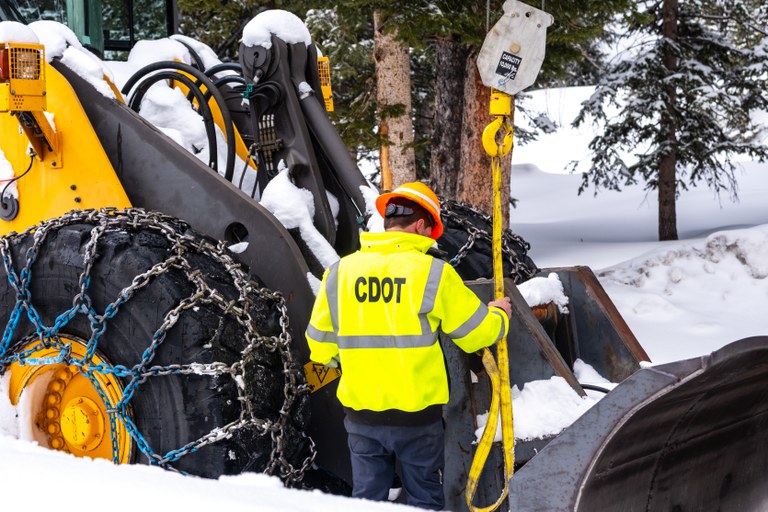The life of a CDOT mechanic
Busted knuckles are a small price to pay for keeping CDOT workers safe on the road
June 3, 2025
Not your typical day on the job
Ryan Smith is a CDOT field mechanic. Some days, he works out of a tidy machine shop in Grand Junction on Colorado’s scenic Western Slope. Other days, he works out of a service truck when deployed along the I-70 mountain corridor, spending his days driving around the high country rescuing CDOT vehicles broken and stranded on the side of the road.
It’s not an easy job. In fact, it can be a hard, dirty, challenging job spent lying under a plow truck on the side of the interstate in a puddle of dirty slush. But Ryan loves what he does. At the end of the day, it just feels good to help people.
Ryan grew up on a farm in Loma, Colorado, and some of his earliest memories are holding a wrench or a flashlight for his dad while he fixed their farm equipment. He also spent his younger years tinkering on dirt bikes and other machinery.
Fixing things was just part of life. Necessary work, but also fun puzzles to solve. So making a career out of it made sense. After a few years working as an agricultural equipment mechanic after high school, Ryan came to work for CDOT.
“I take my job super seriously,” says Ryan. “Because when I work on a truck, I know there’s a person who needs it to get through their shift … to do their job and to get home safe.”

What does a field mechanic do?

From snowplows to weed whips, heavy diesel machines to electric cars, CDOT needs a huge amount of equipment to keep our state highways running smoothly. And we need mechanics of all stripes to keep all that equipment in working order. Maintenance is a big piece of it, but sometimes, things just break — and they break out in the field, far from the tools and experts needed to fix them.
That’s where mechanics like Ryan come in … like AAA, but built for machines that don’t mess around. Our field mechanics are on-call and on the move, ready to wrench in the wild. If an issue can’t be fixed on the spot, they’ll haul the machine back to the shop for major work.
“Trucks almost never break down where we wish they would,” says Ryan, “but wherever they end up, that’s where I go.”
CDOT is Colorado’s largest state agency. It owns and maintains 3,200 machines, including snow plows, construction equipment, tackle trucks, and so on. It has 880 state fleet vehicles driven by CDOT employees.
Mechanics like Ryan need to know how to fix engines big and small, electrical and hydraulic systems. They have to know how to weld and use recovery gear like tow trucks, and increasingly, they have to navigate the advanced technology built into vehicles like snowplows. At times, the job looks more like IT support than mechanical work. It’s not easy, but somebody has to do it.
CDOT vehicles take a beating
Plow trucks, bulldozers, excavators and fleet vehicles — they all put in hard work, day in and day out, year-round, in a state with a brutal climate. We’re just wrapping up the busiest season for CDOT mechanics (not that they have a slow season). The heavy, late-winter and early-spring snows take a serious toll on plows and other snow removal equipment. These machines are big and heavy, and the ones in the high country spend day and night driving up and down steep mountain passes.
Bulldozer blades hit rocks. Mowers that clear medians of grass and weeds run over everything from trash to debris. And fleet vehicles — like CDOT’s fleet of Ford Lightning EV pickup trucks — pack on the miles day after day.
So, there’s no shortage of work for Ryan and his teammates across the region and the state. CDOT employs about 100 mechanics statewide.

It’s really all about safety
Bad things can happen when big machines break. Imagine you’re driving a snowplow through a white-out storm down a steep mountain pass. If your brakes don’t work right, your headlights go out, or even if your windshield wipers stop working, the consequences could be catastrophic — for you as the plow driver or others on the road. The gravity of that isn’t lost on Ryan, and he feels like it’s his duty to make sure things like that never happen.
Mechanics often meet the “owners” of the vehicles on which they’re working. They shake hands and get to know each other. In a city with a small-town feel like Grand Junction, they may even be neighbors. So making sure the job is done right in order to protect the safety of their peers matters that much more.
What does it take to be a CDOT field mechanic?
Beyond a natural knack for mechanical work and a little life experience making broken things no longer broken, a few characteristics seem necessary … curiosity and patience.
“Lifelong learning” is a well-worn phrase, but with the variety of machines CDOT mechanics encounter and the rate of technological change being incorporated into transportation equipment, the need for continued education is only intensifying.
“We're all expected to fix the same things. I mean, whether that’s an engine job that comes in that day, or rebuilding a transmission or an axle the next, you know, whatever it may be, you're expected to bumper-to-bumper fix that truck,” says Ryan.
CDOT provides annual training for its maintenance workforce. While some mechanics, like Ryan, come in with prior experience or formal certifications, most of the training and hands-on skill-building happens on the job. Because much of the work is so specific to the equipment CDOT uses, there’s no better way to learn.
Some equipment is so new, technical or specialized that mechanics have to learn directly from the source — the company that made it. It’s not uncommon for a representative from a heavy-equipment manufacturer to come and do a training session on a new piece of equipment or technology.
And sometimes, according to Ryan, you just have to figure it out yourself.
“This is a job where you definitely have to think on your feet — especially when you’re out in the field,” says Ryan. “I love that about this job. I love that about mechanical work. Just when you think you’ve seen it all, you find yourself with a brand new challenge.”
It’s rewarding, it’s needed
The CDOT Division of Maintenance and Operations is always seeking qualified mechanics, maintainers, plow drivers and more — especially in more rural areas like the Western Slope.
CDOT jobs offer stability and great benefits. But more than that, we offer jobs with a purpose — jobs that are in demand and help keep our communities open for business, open for travel, and keep your neighbors safe on the road. To learn more about careers at CDOT, visit careers.codot.gov.
Thanks to Ryan and the whole Western Slope crew. Without you, our blinkers wouldn’t blink and our plows wouldn’t plow. We couldn’t do it without you!
About the Author

